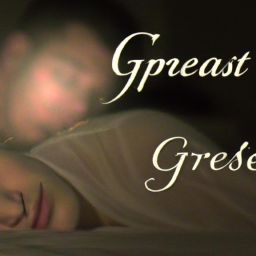Dreaming about a loved one who has passed away feels like receiving a bittersweet gift. It evokes a combination of happiness and sorrow, creating a temporary reunion with the person you have lost.
Dreams have always been fascinating to me, but the ones about my deceased loved ones have a different weight to them. They bring up emotions that I thought I had already processed and make me feel as if I am reliving the moment of their passing.
Losing someone close to you can be a painful experience that lingers on for years. It’s a void that cannot be filled, no matter how much time has passed. Dreams about the deceased can bring up old wounds or serve as a comforting reminder of their presence.
In this article, I’ll explore the significance of dreams and how they relate to the emotional impact of losing someone. We’ll also discuss common themes in dreams about deceased loved ones and how to interpret them. Finally, I’ll share some tips on how to cope with the experience of dreaming about someone who has passed away.
Key Takeaways
- Dreams about deceased loved ones can serve as a way for our subconscious to process emotions and experiences related to grief and loss.
- Coping with dreams of deceased loved ones involves focusing on positive memories, accepting them as a natural part of the grieving process, and finding healthy ways to cope with any emotions that arise.
- Emotional processing is crucial for healing and moving forward after experiencing grief and loss.
- Interpreting dreams about deceased loved ones can bring insight into subconscious thoughts and emotions related to grief and loss, and can be a way to find closure, work through unresolved issues, and find hope and healing in the midst of grief.
Understanding the Significance of Dreams
You’ve probably heard that dreams can hold significant meaning, and when it comes to dreaming about someone who has passed away, it’s no different. Dreams can be a way for our subconscious to process emotions and experiences that we may not be fully aware of while we’re awake.
When we dream about someone who has passed away, it can be a way for our mind to work through the grief and sadness of losing that person. Dreams can also provide a sense of comfort and closure to those who have lost a loved one. It can be a way for us to feel like we’re still connected to that person, even if they’re no longer physically with us.
However, it’s important to remember that not all dreams hold significant meaning and sometimes they’re just a product of our imagination. Regardless, the emotional impact of losing someone can be difficult to navigate, and dreams can be one way to help us cope.
The Emotional Impact of Losing Someone
Losing someone you love can be one of the most difficult experiences in life. Coping with grief and loss is a complex process that can take time and require a lot of emotional work.
It’s important to acknowledge and process your emotions in a healthy way, as emotional processing is crucial for healing and moving forward.
Coping with Grief and Loss
When coping with grief and loss, it can be unsettling to have recurring dreams about a loved one who has passed away. These dreams can bring up intense emotions and make it difficult to move forward with the healing process. Here are some things that have helped me cope with the experience of dreaming about someone who has passed away:
-
Acknowledge your feelings: It’s okay to feel sad, angry, or confused when you have these dreams. Allow yourself to feel your emotions and don’t judge yourself for having them.
-
Talk to someone: Sharing your experiences with a friend or therapist can help you process your feelings and gain perspective on your dreams.
-
Create a ritual: Creating a special ritual, such as lighting a candle or visiting a special place, can help you feel connected to your loved one and provide a sense of comfort.
-
Seek support: Joining a support group or seeking counseling can provide you with a safe and supportive environment to share your experiences and find healing.
While these tips may not make the dreams go away completely, they can help you cope with the emotions and find peace. As you work through your grief and loss, it’s important to remember the importance of emotional processing and finding healthy ways to cope.
The Importance of Emotional Processing
Emotional processing is crucial for finding peace and healing after experiencing grief and loss. It involves acknowledging and expressing one’s emotions, such as sadness, anger, and guilt. Suppressing or avoiding these feelings can lead to prolonged suffering and unresolved grief.
By allowing oneself to feel the emotions and processing them, one can gradually accept the reality of the loss and adjust to a new life without the deceased loved one. Through emotional processing, one may also be able to gain insight and understanding about their dreams of the deceased loved one.
Dreams about deceased loved ones are common and can be a way for the subconscious mind to process grief and emotions. These dreams may involve themes such as the deceased person being alive, communicating with the dreamer, or the dreamer being able to say goodbye. Understanding and exploring these dream themes can provide comfort and closure for those grieving the loss of a loved one.
Common Themes in Dreams about Deceased Loved Ones
I’ve had dreams about my deceased loved ones, and I know I’m not the only one.
In these dreams, I’ve experienced common themes that many people have reported. These include seeing the person alive and well, receiving messages or guidance, and saying goodbye or receiving closure.
These dreams can provide comfort and healing, and it’s important to understand and acknowledge their significance.
Seeing the Person Alive and Well
You can’t believe your eyes when you see the person who passed away standing in front of you, looking healthier and happier than ever before. It feels like a dream, but it’s so vivid that it must be real. You start to wonder if maybe they weren’t really gone, if there was some sort of mistake.
You want to run to them and hug them, but you’re frozen in place. They smile at you warmly and start to speak, but you can’t hear what they’re saying. It’s like you’re underwater and everything is muffled. You strain to hear them, but it’s no use.
Suddenly, they start to fade away, and you’re back in your own reality. As you try to process what just happened, you realize that maybe they were trying to send you a message. Maybe they were trying to tell you that they’re okay, that they’re happy and healthy on the other side.
You start to feel a sense of peace wash over you, and you know that they’re with you always. You’re grateful for this experience, and you’re open to receiving any further messages or guidance they might have for you.
Receiving Messages or Guidance
After experiencing a loved one appearing to me, I now understand and believe in the possibility of receiving messages or guidance from the other side.
It was a few weeks after my grandfather had passed away when I had a vivid dream about him. In the dream, he was sitting in his favorite chair and appeared to be at peace. He looked at me with a smile and said, "Don’t worry about me, I’m doing just fine."
I woke up feeling comforted and reassured that he was okay.
Since then, I have had other dreams where my loved ones who have passed away have appeared to me and provided me with guidance or messages.
While some may dismiss these experiences as mere coincidence or imagination, I believe that they are real and meaningful.
It gives me comfort knowing that my loved ones are still with me in some way. But as much as I cherish these moments, I also know that I need to find a way to say goodbye or receive closure.
Saying Goodbye or Receiving Closure
Finding closure after losing a loved one can feel like searching for a needle in a haystack, but it’s important to remember that it’s possible with patience and self-care. Saying goodbye or receiving closure can come in many forms, but one way that has helped me is through dreams. When I dream about someone who has passed away, it’s like they are visiting me one last time to say goodbye or deliver a final message.
In these dreams, I often feel a sense of peace and closure that I didn’t have before. It’s like the person is telling me they are okay and that it’s time for me to move on. While it can be difficult to accept their absence in waking life, these dreams offer a sense of comfort and allow me to let go of any lingering feelings of sadness or regret. Through these dreams, I have been able to find the closure that I needed to continue on with my life.
Interpretation of dreams about deceased loved ones can offer insight into our subconscious thoughts and emotions.
Interpretation of Dreams about Deceased Loved Ones
Interpreting dreams about deceased loved ones can provide a sense of comfort and closure in the grieving process. Dreams can often be a way for the subconscious mind to process emotions and memories that we may not be aware of in our waking lives.
When we dream about someone who has passed away, it can feel like they’re visiting us from beyond the grave. Some people interpret these dreams as a sign that their loved one is at peace and watching over them. However, it’s important to keep in mind that dreams are not always literal and can have multiple meanings.
Sometimes dreaming about a deceased loved one can bring up unresolved feelings of guilt, anger, or sadness. It’s important to take the time to reflect on the emotions that come up during these dreams and find healthy ways to cope with them.
In the next section, we’ll discuss some strategies for coping with the experience of dreaming about deceased loved ones.
Coping with the Experience of Dreaming about Deceased Loved Ones
When coping with dreams of loved ones who have passed, it can be helpful to focus on positive memories and find ways to honor their legacy. Dreams about deceased loved ones can be emotional and overwhelming, but they can also be a source of comfort and connection.
I’ve found that writing about my dreams or talking to a trusted friend or family member can be cathartic and help me process my emotions. It’s also important to remember that these dreams don’t necessarily have a deeper meaning or message. They may simply be a reflection of our own thoughts and feelings.
By accepting these dreams as a natural part of the grieving process, we can find peace and healing. Ultimately, the most important thing is to hold onto the love and memories we shared with our loved ones and find ways to keep their spirit alive in our hearts.
Frequently Asked Questions
Are dreams about deceased loved ones always a sign of something significant or meaningful?
Dreams about deceased loved ones are not always significant or meaningful. Sometimes they are simply our mind processing grief or memories. However, they can also offer comfort or closure. It’s subjective.
Can dreams about deceased loved ones be a way of communicating with them beyond the grave?
Dreams about deceased loved ones may offer a sense of connection, but it’s important to remember they’re just dreams. While they may feel like communication, it’s unlikely they hold any deeper meaning beyond our subconscious processing of grief.
Is it common to experience physical sensations or changes in the dream world when dreaming about someone who has passed away?
It’s not uncommon to experience physical sensations while dreaming, such as feeling weightless or heavy. However, whether dreaming about a deceased loved one causes physical changes specifically is unclear and may vary from person to person.
How can I differentiate between a dream and a visitation from a deceased loved one?
Sometimes it’s tricky to tell if it’s a dream or a visitation, but I try to focus on the details. If it feels too real to be a dream, like I can sense their energy, it might be a visitation.
Is it normal to feel guilty or ashamed about having dreams about someone who passed away?
It’s normal to feel guilty or ashamed about dreams involving anyone or anything that evokes strong emotions. It’s important to remember that dreams are a natural part of our subconscious and not something we can control.
Conclusion
As I reflect on my experiences of dreaming about my deceased loved ones, I realize that these dreams are more than just random images or thoughts. They’re a symbol of the connection I still have with those who passed on.
Through dreams, I’m able to feel their presence and hear their voices, reminding me that they’re never truly gone. While these dreams can be emotional and even unsettling at times, they also provide a sense of comfort and closure.
They allow me to process my grief and find peace in the knowledge that my loved ones are still with me in some way. Dreams about deceased loved ones are a reminder that death may end a life, but it doesn’t end a relationship.









